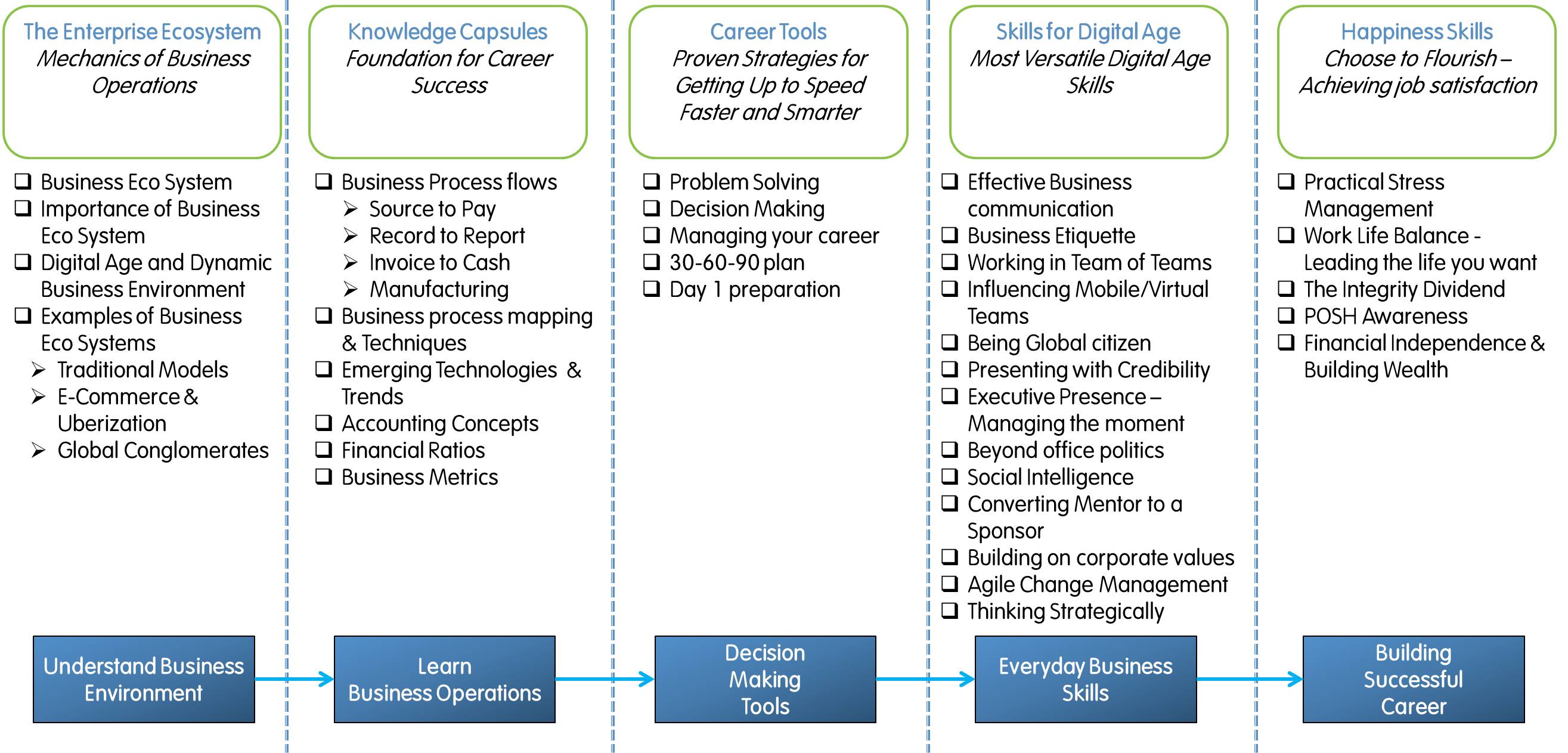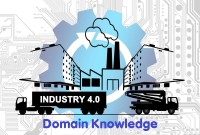- Home
- Business Processes
- Industry Knowledge
- Aerospace Industry
- Automotive Industry
- Banking Domain
- BFSI Industry
- Consumer/ FMCG Industry
- Chemicals Industry
- Engineering & Construction
- Energy Industry
- Education Domain
- Finance Domain
- Hospitality Domain
- Healthcare Industry
- Insurance Domain
- Retail Industry
- Travel and Tourism Domain
- Telecom Industry
- Leadership Skills
- eLearning
- Home
- Leadership Skills
- Career Management
- Discover Your Career Direction
Discover Your Career Direction
The process of finding career direction begins with specific career exploration and identification of a career that could be passionate about, a career that allows you to make the optimum use of your talents. After identification of the career, you need to acquire skills and tools, and education that can help you get entry into your dream career. Learn the important tips that you cannot afford to miss.
When you think about your career, it is about improving your life, not just about selecting a job. The career you choose and the way you plan it and shape it continuously will have an enormous impact on how you live your life. A huge amount of information is available on occupations, but most people don’t know how to go about making good career decisions—or they don’t take the time to look. Each one of us is different and has different interests and particular talents, and if you choose a career where you get an opportunity to work on these talents, strengths and interests then that expression brings the best in you and creates happiness.
A certain type of work or workplace may interest you as much as a certain type of job. If your interests and values lead you to work in information technology, for example, you can do this in a variety of work environments, in a variety of industries, and in a variety of jobs. You could be a programmer, a functional consultant, a hacker (!!!), or a Project Manager. For this reason, we suggest you begin exploring alternatives by following your interests and finding a career path that allows you to use your talents to do something you enjoy.
Discovering Career Interests:
The process of finding career direction begins with specific career exploration and identification of a career that could be passionate about, a career that allows you to make the optimum use of your talents. After identification of the career, you need to acquire skills and tools, and education that can help you get entry into your dream career. And then you need to do regular career planning to set the course of your life and career in the right direction.
How to Identify What Interests You:
Most people spend more time watching TV in a week than they spend on career planning for an entire year. Yet most people will change their jobs many times and make major career changes five to seven times. It is important for you to spend time considering your career options and preparing to advance. But unfortunately, at the beginning of your career, you don’t know what you don’t know! To find out which career matches with your options you need to know your options, what is available in the market, and if nothing is available what is the potential to create one. Understanding your talents and life preferences by doing a self-evaluation can help you take a talent-based approach to your career search from the beginning.
Exploring Your Strengths and Passions:
You need to introspect to find out what activity, task, or field makes you committed. What are the things that you are passionate about? What are the areas where you feel the enthusiasm and your creativity is at its peak? Self-Evaluate yourself to find out what are some of your key strengths and weaknesses and what keeps you going. Brainstorm and try to find out the top 3 to 4 key talents where you feel you are the best, or you are at your best. We will also recommend you consider going through the strength finder evaluation in "Now Discover Your Strengths".
If you are in your early career stages (studying, doing professional courses, internship, training) explore the Early Career Guide.
Exploring Careers:
Career-related books and videos can provide you with valuable information. The Internet is a vast source of information and you can get job descriptions and skill and educational requirements for every possible career. U.S. Department of Labor published and also makes available online “Occupational Outlook Handbook”. It is the most widely used source of job information. It can help you familiarize yourself with more than 300 job descriptions. You get also get supplemental information like the latest details on pay, education, job growth, working conditions, etc.
You can get detailed information about jobs and careers through the Occupational Information Network (O*NET), a major occupational information system created by the U.S. Department of Labor and used by state employment service offices to classify applicants and job openings and by some career information centers and libraries to file occupational information. At the O*NET site at www.online.onetcenter.org, you can search for occupations that match your skills. For each occupation, O*NET reports information about tasks performed, knowledge, skills, abilities, and work activities. It also lists interests; work styles, such as independence; and work values, such as achievement, that are well suited to the occupation.
Career and Values:
Do you know what your life's topmost preferences are? Do you know what matters to you the most? Watch this video to discover your true self... watch this to find out what makes you happy, what it around which your life evolves is. Knowing specifically what you want is much different than knowing what you don't want. Once you know what matters to you, your intentions get focused and you channelize all your energies to accomplish that. Initially, everyone has difficulty with this question because the answer is hidden deep within you.
Recognize that to be happy, you must live the life that you truly want to live. It's your life and you are the only one who can truly determine what is right for you. This is just one of the cool tools that can start the process of introspection, helping you ask yourself what you have inside. Follow not what you are told, but what you are and what you love..."
This video focuses on your value system. If you try to pursue a career path that conflicts with your values and your beliefs then you'll struggle constantly. This video kicks the thinking process to understand the values that matter most to you, identify your top values, and once they are surfaced, you can brainstorm on the jobs that you think would suit your values.
Career Assessments:
Career assessments can help you think more about your interests and skills and how they relate to careers. While no assessment can tell you what to do, assessments can help you think more clearly about a career direction. Online career tests also help in exploring options that you might have missed.
Some good assessments are:

Career Research:
Once you have shortlisted some careers that make optimum use of your talents, provides you opportunities to polish your strengths and skills, and do not conflict with your value system, the next step is to research the various options and finalizing the Career Path you want to pursue. Career Research, doing a deep dive into your options, is a vital step to eliminate choices that seem to be great but might not align with your talents, skills, vision, mission, and values.
Some recommended methods:
- Using career sites like Acinet.org
- Exploring Labor Data at http://www.bls.gov/ooh/
- Exploring Career Profiles at http://www.onetonline.org/
- PEST Analysis
- Industry/Career Magazines
- Attending Professional and Trade Shows
- Participating in Job Fairs
- Working Part-Time
Gaining Delta Skills:
After gaining an understanding of the dynamics of the career you want to pursue you may realize that you might need to get additional training or education to be able to successfully gain entry to that career path. After gathering your initial impressions of what a job is all about, you need to understand how to prepare for it.
Some tips for gaining additional skills are:
Training or education beyond high school is now typically required to get better jobs. For a few occupations, especially those in which skill requirements are advancing rapidly, to be certified or licensed, a worker usually is required to complete one or more training courses and pass one or more examinations. Most occupations do have mandatory licensure or certification requirements.
Some occupations have professional credentials granted by different organizations, in which case the most widely recognized organizations need to be enrolled. You need to understand the desirable skills, aptitudes, and personal characteristics that employers look for.
Getting Hired:
Spend some time to understand current job trends and learn the basics that are most important in planning your career and in reducing the time it takes to get a job. Find sample professionally written resumes for the job that you are aspiring to and use these as examples when creating your own resume. It is often not the best person who gets the job, but the best job seeker. People who do their career planning and job search homework often get jobs over those with better credentials. They are able to get more interviews and do better in interviews making the difference.
Career Advancement:
Your career will provide you with advancement opportunities throughout your life, that may be available after you gain experience in an occupation. Advancement can come in several forms, including advancement within the occupation, such as promotion to a management position, advancement into other occupations, and advancement to self-employment. A career plan for promotion would take into consideration three important characteristics—competency, visibility, and opportunity. Having the right skills, abilities, knowledge, and attitudes aren’t sufficient to get you a new position. You also need to be visible to those who make the promotion decision. Maybe even more importantly, you have to be in the right place at the right time. You may also have to make some tough decisions about your personal management style if you choose to stay in your current organization. If that organization is undergoing changes in style and values, you might have to make dramatic shifts in your management approach. You will have to adapt your interpersonal communication and leadership styles to reflect the new organizational design and work process.
As you pursue your dream career with confidence backed by logical analysis and timely planning, there are certainly no guarantees but with persistence, the career that you are meant for will materialize.
Explore Technofunc Toolkit for Building Skills
Technofunc resources aim at bridging the gap and we have invested a lot of effort into creating tutorials on various business processes and industry knowledge. Our curriculum is designed to equip a person to leverage technology as well as learn critical business application processes along-with system integrity and security, systems audit, project management, and other key methods widely used today that helps in the integration of business processes and practices in tune with the requirements that are driven both by business, globalization and legislature. We help you gain expertise in both technical and functional skills, which when applied collectively comprise of professional competence and excellence.
Given below are the different technofunc resources to start building your technical leadership skills:
Build Domain Skills
- Aerospace Domain
- Automotive Domain
- Banking Domain
- BFSI Domain
- Consumer / FMCG Domain
- Chemicals Domain
- Engineering and Construction Domain
- Energy Domain
- Education Domain
- Financial Management & Business Dynamics
- Global Markets Domain
- Hospitality and Leisure Domain
- Healthcare Domain
- Insurance Domain
- Technology Domain
- Retail Domain
- Travel Domain
- Telecom Domain
Related Links
You May Also Like
-
Team Development by Building Trust
As your team begins to work together, you need to establish a way each team member can exchange ideas and build mutual trust. Successful groups are built on trust and collaboration. A free exchange of ideas, in an open environment, will allow your team to get to know each other and enable you to check on how they work together. Learn some tips to help build team trust and establish personal bonds.
-
Guide to Technical Leadership Skills
Technical leaders care about building amazing products and the best technical capabilities in their teams. Everything they do is focused on improving the user experience and bringing competitive advantage for their organization. Learn the skills and competencies you need to build a technical career path for yourself that starts with building technical expertise and grows into developing technical leadership.
-
Navigating your career journey will hopefully include a series of experiences that challenge your skills and abilities in ways that are satisfying and rewarding. Only you can manage your career. That means you must determine what things you are passionate about, what your goals are, both professionally and personally, and how much energy you are willing to invest along the way. Learn how to build an effective career path framework for yourself.
-
Building Your Domain Knowledge
Domain knowledge from a career management perspective encompasses the understanding of industry dynamics and business processes of the target operational area. Domain expert exhibits clear knowledge in the respective industry and understands the industry concepts in general. It is always recommended to best highlight your exposure of domain in your resume or cover letter. TechnoFunc provides you with the best tutorials to gain domain knowledge in a large number of industries and business areas.
-
Concept & Definition of Stress
Stress is a popular expression used by people in day to day life. Pressures of day to day living sometimes necessitate coping or dealing with them and stretch the body beyond its natural capacity. They are called stressors. Stress is a natural, ongoing dynamic, and interactive process that takes place as people adjust to their environment.
-
“Level 5 Leadership”, this term was coined by Jim Collins in his book “Good to Great” and it is all about achieving "Greatness" as a leader. This article will explain what we mean by Level 5 Leadership and what the characteristics of a Level 5 leader are. What it takes to achieve greatness as a leader, and what are the steps and strategies that one can use to move up to this top level of leadership.
-
Technology represents tremendous value if you view it from the proper perspective. IT empowerment also has its various levels in any organization. As a CIO or IT Senior Leader, you should try to move the technology function up the value chain. Learn how to transform your service delivery organization being looked upon as another cost center to a business partner that provides valuable services and brings competitive advantage for the business.
-
Authentic leadership is an approach to leadership that emphasizes building the leader's legitimacy through honest relationships with followers which value their input and are built on an ethical foundation. The authentic leader acts upon his or her values and beliefs, and inspires others to do the same, is committed to know and develop oneself. Are you committed to developing yourself; know your motivations and the purpose of your leadership? Read this article to know more about authentic leadership style and discovering your authentic self.
-
A manager or an employee in an organization who is experiencing a high level of stress may develop high blood pressure, ulcers, irritability, difficulty in making routine decisions, loss of appetite, accident proneness, and the like. These can be subsumed under three general categories, physiological, psychological, and behavioral symptoms. Stress can give rise to a number of changes.
-
Tips for Effective Time Management
After studying and analyzing how time is spent, why time is wasted, and where time is wasted you need to decide about the changes required for effective utilization of time. For this purpose, a large number of remedial measures can be taken by you. The first and foremost determinant of a planned and purposeful utilization of time is to develop consciousness of the value of time at all levels of the organization. Planning, goal setting, and defining priorities are concerns to addressed immediately.
Explore Our Free Training Articles or
Sign Up to Start With Our eLearning Courses

About Us
Learning
© 2023 TechnoFunc, All Rights Reserved










